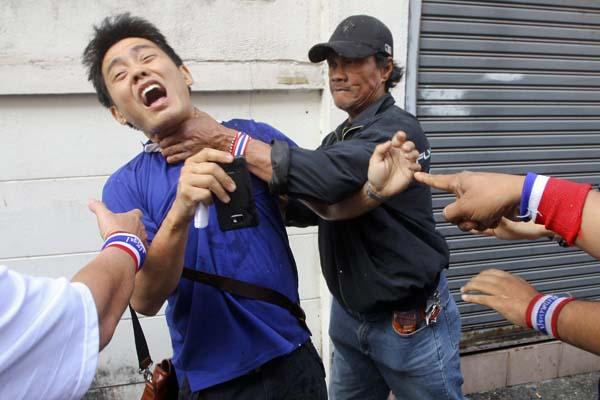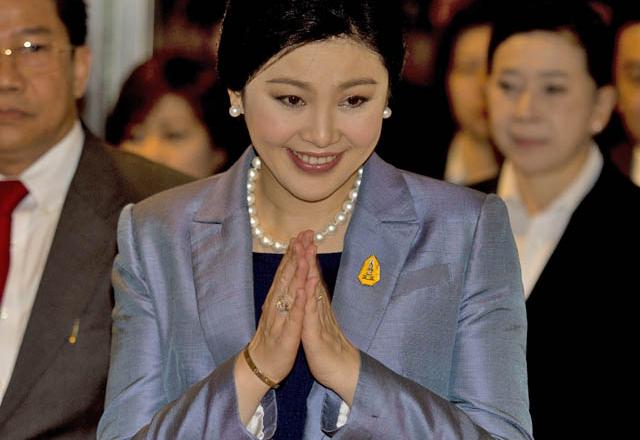BANGKOK — A Thai anti-government protest leader was shot dead on Sunday as demonstrators besieged polling stations in Bangkok and forced most to close, hampering advance voting for next weekend’s disputed election.
More than two million people are registered for advance voting before the February 2 election, which was called by Prime Minister Yingluck Shinawatra to try to defuse rising political tensions after weeks of mass anti-government protests.
Protesters descended on scores of polling stations in the Thai capital and several southern provinces, stopping ballot officials from entering and prompting election authorities to shut at least 45 venues.
As the disrupted polls closed on Sunday afternoon a leader of the anti-government rallies was gunned down while he gave a speech from the back of pick-up truck in a Bangkok suburb.
Nine other people were injured in the shooting, according to the city’s Erawan emergency centre, with the violence deepening doubts over the viability of next weekend’s ballot.
“The government has failed to provide any safety and security for anybody today despite the emergency decree,” protest spokesman Akanat Promphan told AFP, referring to a government order empowering police to control protests.
Akanat accused a “pro-government mob” of carrying out the attack which killed Suthin Tharathin — a leader of the Dharma Army, a Buddhist organisation which has been prominent in the demonstrations.
Each side in the bitterly divided kingdom routinely blames the other for the violence.
Suthin was the 10th person to be killed during nearly three months of rallies that have sparked international concern and investor fears over the country’s economy.
Pressure to delay poll
Sunday’s blockade of polls denied the franchise to thousands of registered voters and flouted the government-imposed state of emergency.
“Forty-five polling stations had to be closed out of 50 in Bangkok,” said Surapong Tovichakchaikul, deputy prime minister and one of the main figures at the Centre for Maintaining Peace and Order, which is handling the crisis.
Away from the capital voting went ahead in 66 of the country’s 76 provinces, including the ruling party’s heartlands in the north and northeast, he said.
Yingluck, who has so far refused to resign or delay the poll, is set to meet elections officials on Tuesday after the constitutional court ruled that the general election could legally be delayed because of the crisis.
While the protest augurs badly for next weekend’s general election, Yingluck is likely to press on with the ballot regardless, according to Pavin Chachavalpongpun, associate professor at the Centre for Southeast Asian Studies at Japan’s Kyoto University.
“I don’t think it will increase pressure on her to postpone it... she wants to boost her government’s legitimacy with a quick election,” Pavin added.
The demonstrators, who have staged a near two-week “shutdown” of Bangkok to try to derail the vote, have rejected the election.
They had insisted they would not obstruct advance voters, although analysts have questioned whether the disruption is tantamount to intimidation of the electorate.
Advance voting is routinely offered for those who cannot cast their ballot on polling day. But Sunday’s exercise was seen as a test of the prospects of holding next weekend’s vote peacefully.
Deep divisions
Demonstrators want to topple Yingluck’s elected government and install an unelected “people’s council” to implement loosely defined reforms which they hope will rid Thailand of the influence of ousted former leader Thaksin Shinawatra — Yingluck’s older brother.
They say another poll victory for the ruling party will further embed the Shinawatra clan in Thai politics.
At a polling station in the capital around a dozen frustrated voters said the poll closure amounted to an assault on their democratic freedoms.
“I came to protect my rights,” said 75-year-old Vipa Yoteepitak.
“We can’t let this happen, if we don’t fight today [to vote], we will keep losing our rights.”
Thais have been left divided by years of political turmoil that began shortly before Thaksin was deposed in a military coup in 2006.
The crisis roughly pits Thaksin’s supporters from rural and urbanised communities in the north and northeast against his foes within the country’s elite, the Bangkok middle classes and parts of the south.
The billionaire tycoon-turned-politician — who lives abroad to avoid a jail term for corruption that he says was politically motivated — has won every election since 2001 either directly or more recently through allied parties.
But his opponents accuse him of corruption, “vote buying” and pushing through expensive populist policies to strengthen his electoral position.

















